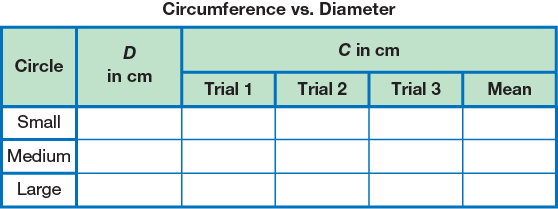Yellow
Green
Blue
Red
Magenta
Remove

Take your measurements from at least three different-sized cans or lids.
- Measure the diameter for each circle to the nearest tenth of a centimeter. Compare your measurements to your partner's measurements. Agree on the length of the diameter for each circle. Then record the value in a table similar to the one shown below.
- Measure the circumference of each circle to the nearest tenth of a centimeter three times. Record each of your measurements in a table similar to the one shown below.
- Use a calculator to find the mean circumference for each size can or lid and record it in your data table. Find the mean to the nearest tenth of a cm.
- Why is it a good idea to do more than one trial and find a mean value for the circumference of each can or lid?


- Make a graph of your data.
- Decide whether to make a bar graph or a point graph.
- Plot the diameter on the horizontal axis and the circumference on the vertical axis.
- Scale your graph to at least 100 centimeters for the circumference and 25 centimeters for the diameter.












